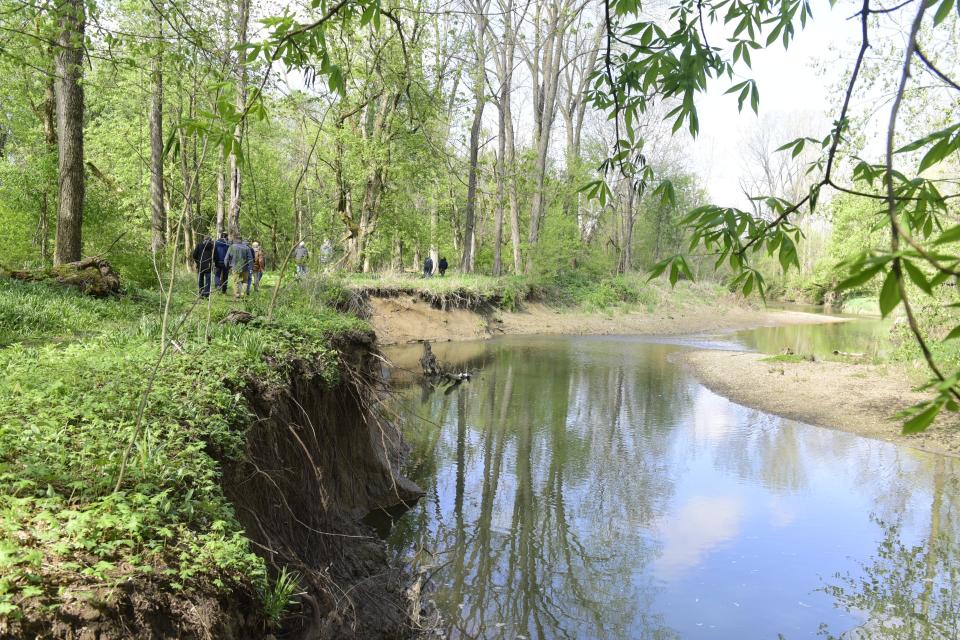Two 'fatal flaws' in ditch petition keep commissioners from cleaning Black Fork River
Progress toward keeping the Black Fork River clear of debris has been halted.
After more than two years talking about the river's cleanup, commissioners from Richland and Crawford counties decided last week to end the conversation with hopes it will begin again sometime in the future.
The break in the discussion was legally required because two "fatal flaws" were discovered in the handling of the proposed project, according to Cliff Mears, one of Richland County's three commissioners and president of the two-county joint board.
Those flaws include falling about 5,800 signatures short on the petition and improper order of procedures during a public hearing, the commissioner said.
"I requested a motion to find that the joint board lacks jurisdiction to continue with consideration of the pending ditch petition," Mears told the News Journal.

Shelby mayor filed the ditch petition in February of 2021
The Black Fork River has been flooding in Shelby since the late 1800s, and at least a dozen major floods have threatened lives, destroyed businesses and washed away homes.
Those in 1987, 2007 and 2011 were the highest, with the 2007 event considered the city's flood of record.
For most of the mid 2010s, officials worked with the Muskingum Watershed Conservancy District on a plan to reduce flooding along the Black Fork. By June of 2018, though, Richland County commissioners finally walked away from flood mitigation plans that would have cost the county's taxpayers as much as $80 million.
Private residents then raised more than $300,000 to hire a company that used heavy machinery to pull hundreds of trees out of an 18-mile section of the river. Removing those obstructions has kept the river from flooding since.
To make sure the hard work was not lost, Shelby Mayor Steven Schag filed a ditch petition in February of 2021, requesting that commissioners from Richland and Crawford counties raise money to continue the cleaning and maintenance of the 18-mile stretch of river by forming an assessment to properties in the watershed.
'What's required and what's recommended'
The committee of six commissioners — three from each of the neighbor counties — listened in May to a presentation from Adam Gove, engineer of Richland County.
Gove told them then that, in the two years since Schag had filed the petition, he had gone through an extensive process of gathering logjam and other data from the river, eliciting opinions on the project from various government agencies, and compiling an idea of what a thorough and compliant river-cleaning project might cost.
Gove explained during the May presentation that his job required him to gain approval from all applicable government agencies and departments to provide the most extensive cleanup plan possible, to follow all state and federal laws, and to add a financial buffer to his estimate to account for any extra expenditures the project may incur.
The engineer budgeted $2.1 million to remove all of the problem trees and logjams, $750,000 to restore habitat along the river once the project is completed, $300,000 to conduct environmental impact studies, and another $180,000 for inspection.
That was a far cry from what the six commissioners had expected to hear. They agreed during that meeting to spend time determining "what's required and what's recommended."
The commissioners' legal council for the ditch petition, Jon Burton, told them in May that making too many changes to project proposals could void the original ditch petition and force commissioners to start the entire process over.
'It wasn't a dismissal'
After two months of research, the attorney reported to the commissioners that it didn't really matter how many changes they made to the proposed project, because the entire ditch petition had been doomed from the outset.
Burton's biggest concern, Mears reported, was that the petition had not been signed by the appropriate people.
Research has shown that water from 10,567 parcels of land across Richland and Crawford counties flows into the Black Fork River. Those parcels are owned by people who have 5,905 different addresses.
"The attorney told us that, after studying the Ohio revised code, all 5,905 landowners needed to be on that petition," Mears said. "We have 68 signatures. Nowhere close to enough."

The second "fatal flaw" that Burton revealed to the commissioners was also made two years ago.
"Our first public hearing, which was Aug. 5th of 2021, was conducted in such a way that it was really public comments," Mears said.
The attorney explained last week that the hearing should have been much more formal.
"These people speaking out needed to provide testimony and evidence closer to a court of law than the way we handled it as a public hearing," Mears said.
With those two "fatal flaws" in mind, the group of commissioners chose to be careful not to make any decisions on the matter.
"It wasn't a dismissal," Mears said. "It had to be identified such that we didn't have jurisdiction, because, primarily, the lack of signatories on that document."
'Really the benefit is to private landowners'
The decision to bring an end to Schag's ditch petition nullified all of the work done over the past two years.
"It's basically starting over now," Mears said. "We can't do anything with the existing petition."
The commissioners also have no authority to resume the efforts to maintain the Black Fork River on their own.
"The board of commissioners has to remain neutral," Mears said. "We can't initiate anything."
That's because even though the entire city benefits from a reduction in flooding, on paper it looks a little different.
"Really the benefit is to private landowners," Mears said. "Not to the public."
He assumes that someone might file a new petition, but reiterated that the action cannot be taken by any of the six commissioners.
"The problem still exists," Mears said. "It's really up to the outside, you know, the landowners and so on, how they want to proceed going forward."
A new law, Mears added, will allow the county's prosecutor to act as the commissioners' legal council for any future ditch petitions, which will eliminate the need to hire outside council.
ztuggle@gannett.com
419-564-3508
Twitter: @zachtuggle
This article originally appeared on Mansfield News Journal: 2 'fatal flaws' kill plan to clean up Black Fork River

